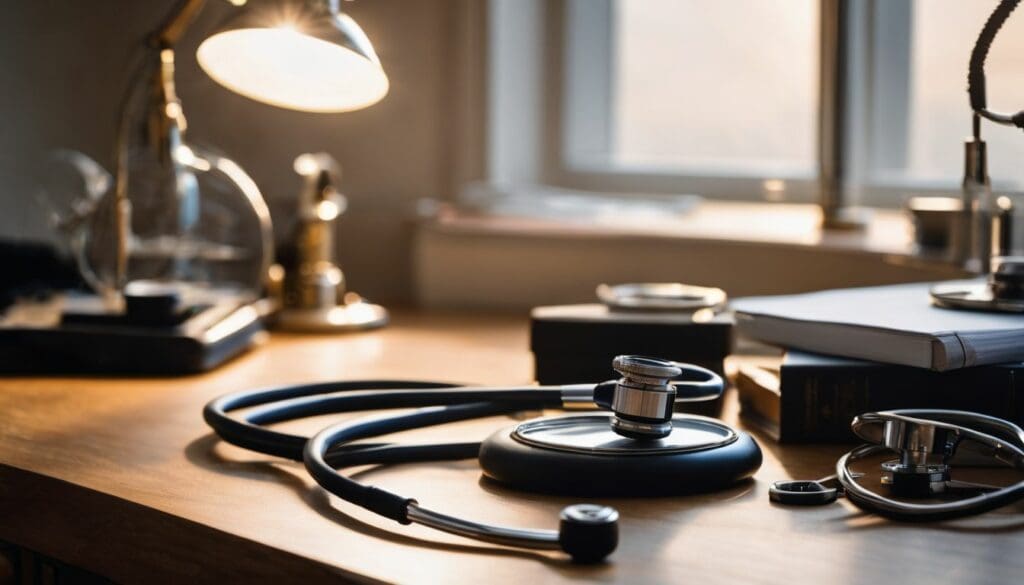Many of us forget to prioritise our health until something goes wrong. Did you know that regular health check-ups can catch problems before they become serious? Our guide will walk you through their vital role in keeping you healthy and potentially saving your life.
Keep reading; it’s about your well-being!
Key Takeaways
- Regular health check – ups detect issues early, improving treatment outcomes and preventing serious illnesses.
- Routine screenings for cancer, heart disease, diabetes, and STI are vital for maintaining overall well-being at all ages.
- Children’s growth and development benefit from regular check – ups, while adults can manage risk factors for chronic diseases.
- Older adults should have frequent medical exams to monitor and manage age-related conditions effectively.
- Finding a trusted healthcare provider who supports eco – conscious practices enhances personal and environmental health.
What are Regular Health Check-Ups?
Regular health check-ups are preventive screenings and tests that help detect chronic illnesses, cancer, and other health issues early on. They are essential for maintaining overall well-being.
Preventive health screenings
Preventive health screenings are essential to catch health issues before they become serious. They’re a key part of staying healthy and supporting the body’s ability to thrive in a clean environment.
- Check blood pressure regularly: High blood pressure can lead to heart disease, but catching it early can prevent complications.
- Screen for cholesterol levels: This helps identify the risk of developing heart problems and guides dietary and lifestyle changes.
- Get diabetes screenings: Early detection of diabetes allows for better management and reduces the likelihood of severe complications.
- Schedule cancer screenings: Screenings such as mammograms and colonoscopies can detect cancer early, improving treatment outcomes.
- Have routine immunisations: Staying up-to-date with vaccines prevents the spread of infectious diseases and protects community health.
- Undergo body mass index (BMI) assessments: Monitoring BMI can indicate whether you’re at a healthy weight, helping ward off obesity-related illnesses.
- Carry out skin checks: Regular examinations by a doctor or self-examinations help detect early signs of skin cancer.
- Perform mental health evaluations: These are vital for maintaining emotional well-being and addressing issues like depression or anxiety early on.
Chronic illness detection
Regular health check-ups play a crucial role in detecting chronic illnesses early on, which includes conditions like diabetes, hypertension, and heart disease. These screenings can help identify any underlying health issues before they become serious problems.
By getting routine medical exams and tests, individuals can ensure that any potential illness is caught in its early stages when treatment options are most effective.
Engaging in regular health assessments also allows healthcare professionals to monitor changes in key indicators of wellness over time, pinpointing signs of chronic illnesses more effectively.
Cancer screenings
Detecting chronic illnesses is crucial, and cancer screenings are a vital part of regular health check-ups. By undergoing routine screenings for various types of cancer, individuals can increase their chances of early detection and treatment.
These screenings play a significant role in preventative healthcare by identifying any potential risks or early signs of cancer. Through regular screenings such as mammograms, colonoscopies, or skin checks, individuals can take proactive steps to maintain their overall well-being.
This proactive approach aligns with the values of environmentally conscious individuals who prioritise preventative measures over reactive treatments.
Why Regular Health Check-Ups are Important
Regular health check-ups are important for the early detection of health issues, improving chances of effective treatment and reducing the risk of developing serious health problems.
They also help to maintain overall well-being.
Early detection of health issues
Early detection of health issues is crucial for maintaining overall well-being. By attending regular check-ups, you can identify any potential health concerns at an early stage, allowing for more effective treatment and management.
Preventive screenings play a key role in monitoring physical and mental health, ensuring that any underlying conditions are addressed promptly to reduce the risk of developing serious health problems.
Regular medical exams also contribute to disease prevention efforts by identifying potential risks early on. By prioritising routine health assessments and utilising at-home resources when necessary, individuals can establish consistent habits that support their general health maintenance.
Improved chances of effective treatment
Regular health check-ups significantly improve the chances of effective treatment by identifying potential health issues at an early stage. This allows for prompt intervention and management, leading to better outcomes.
Detecting conditions early through routine medical exams can help in addressing them before they escalate, therefore reducing the risk of developing more severe health problems. By prioritising regular physical examinations, individuals can proactively manage their well-being and seek appropriate medical support when needed.
For environmentally conscious individuals, supporting conservation and environmental causes, regular health screenings play a vital role in promoting long-term sustainability. By ensuring both physical and mental well-being through consistent healthcare monitoring, individuals can contribute positively to the protection of our planet’s resources and biodiversity.
Reduce risk of developing health problems
Regular health check-ups can help to reduce the risk of developing health problems by allowing for early detection and treatment of potential issues. Through preventive screenings, chronic illness detection, and cancer screenings, individuals can take proactive steps towards maintaining their overall well-being.
By scheduling routine heart health, diabetes check-ups, bowel cancer screenings, eye exams, bone density tests, STI screenings and women’s or men’s health check-ups at different stages of life, one can significantly decrease the likelihood of serious health complications.
Frequent medical assessments also play a crucial role in promoting physical and emotional well-being through consistent monitoring of both mental and emotional health. With routine evaluations becoming part of one’s regular healthcare routine across all age groups – from children to older adults – individuals are empowered to stay ahead of potential risks or illnesses before they escalate into significant concerns.
Maintain overall well-being
Regular health check-ups are essential for maintaining overall well-being. Ensuring that your physical, mental, and emotional health is monitored through routine medical exams and wellness assessments can significantly contribute to your general well-being.
By prioritising regular health screenings and check-ups, you can take proactive steps towards preventing potential health issues from escalating.
Consistent health monitoring also allows for early detection of any underlying conditions or illnesses, offering improved chances of effective treatment. This approach not only reduces the risk of developing serious health problems but also promotes a holistic approach to personal well-being, aligning with environmentally conscious practices that value sustainable living and self-care.
Types of Regular Health Check-Ups
From heart health to STI screenings, regular health check-ups cover a range of important areas to ensure overall well-being. Each type of check-up plays a crucial role in early detection and prevention of various health issues.
Heart health
Heart health is vital for overall well-being. Regular check-ups are crucial in monitoring the condition of your heart and identifying any potential issues early on. These check-ups typically involve blood pressure checks, cholesterol screenings, and evaluations for heart disease risk factors.
They play a significant role in preventing future cardiovascular problems and maintaining a healthy heart. Ensuring that you schedule regular appointments with your healthcare provider helps to keep your heart in good shape, promoting long-term wellness.
Diabetes check-ups
Regular diabetes check-ups are crucial for monitoring blood sugar levels, preventing complications, and managing the condition effectively. During these check-ups, healthcare providers review the patient’s glucose levels and assess any potential risk factors or signs of complications.
They also perform physical exams to check for any diabetic-related issues and provide guidance on lifestyle modifications to better manage the disease.
Patients are advised to undergo regular eye exams that can help detect early signs of diabetic retinopathy, a complication affecting the eyes. In addition to this, routine kidney function tests can identify diabetes-related kidney problems at an early stage.
Bowel cancer screenings
Bowel cancer screenings can detect the early signs of bowel cancer, improving the chances of successful treatment. These screenings are important for everyone, especially as we age.
They can help to identify any abnormalities in the colon or rectum before they develop into a more serious problem. By having regular bowel cancer screenings, individuals can maintain their overall well-being and reduce the risk of developing advanced stages of this type of cancer.
Eye exams
Eye exams are an essential part of routine health screenings, and they play a crucial role in maintaining good vision and overall well-being. Regular eye check-ups can help detect early signs of eye conditions such as glaucoma, cataracts, or macular degeneration, which can significantly impact visual health.
By prioritising eye exams, individuals can ensure that any potential issues are identified early on, allowing for prompt treatment and preventing further deterioration of their eyesight.
Moreover, proactive eye care through regular check-ups contributes to sustainable living by reducing the need for more invasive treatments that may have higher environmental footprints.
Bone density tests
Bone density tests measure the strength and density of your bones, helping to identify osteoporosis or assess your risk for fractures. During a bone density test, low-dose X-rays scan specific bones, usually in the hip, spine, and forearm.
The results indicate if you have normal bone density, low bone density (osteopenia), or osteoporosis. This information plays a crucial role in preventing and managing bone-related health issues, such as fractures and breaks.
Ensuring regular bone density tests can aid in monitoring the effects of environmental factors on bone health. It also allows for early intervention with lifestyle changes or medical treatments to maintain strong and healthy bones.
STI screenings
Moving from bone density tests to STI screenings, it’s important for everyone to prioritise sexual health by getting routine screenings. STI testing is crucial for detecting and treating sexually transmitted infections early, reducing the risk of complications, and preventing further transmission.
Regular STI screenings can help individuals maintain their overall well-being and contribute to public health efforts in preventing the spread of infections.
Regular STI screenings involve simple and painless tests that can be conducted at healthcare facilities or with at-home test kits. By prioritising these check-ups, individuals can support environmental conservation efforts by promoting healthier communities and reducing the prevalence of untreated infections in society.
Women’s health check-ups
Moving on from STI screenings, women’s health check-ups are essential for maintaining overall well-being. Regular gynaecological exams and breast cancer screenings are crucial in detecting any potential health issues early.
These check-ups also include pelvic exams, pap smears, and discussions about reproductive health concerns. Additionally, bone density tests help in assessing the risk of osteoporosis, a common concern for women as they age.
It is important to prioritise these routine appointments to ensure proactive management of women’s specific health needs.
Men’s health check-ups
Men’s health check-ups are vital for maintaining overall well-being. Regular screenings can detect potential health issues early, improving the chances of effective treatment. By prioritising routine medical exams such as heart health and diabetes check-ups, men can reduce their risk of developing chronic illnesses and maintain physical and emotional health.
Frequent health assessments play a significant role in monitoring men’s physical and mental well-being. Benefiting from regular medical tests enables individuals to stay proactive about their health while ensuring they receive timely care when needed.
Benefits of Regular Check-Ups for Different Age Groups
Children and adolescents can benefit from regular health check-ups to monitor growth and development, while young adults can detect early signs of chronic illness. Middle-aged adults can manage risk factors for heart disease and diabetes, and older adults can maintain cognitive function and prevent age-related conditions.
Children and adolescents
Regular health check-ups are crucial for children and adolescents in maintaining their overall well-being. These assessments play a vital role in monitoring physical, mental, and emotional health while detecting any potential issues early.
Health screenings can aid in identifying developmental concerns, ensuring timely management and intervention when necessary. Additionally, routine check-ups provide an opportunity to discuss healthy habits and preventive measures to support long-term wellness among young individuals.
These preventive measures contribute significantly to the sustainable development of future generations by promoting healthier lifestyles from an early age. By prioritising regular health evaluations for children and adolescents, we can ensure a positive impact on their immediate well-being as well as their long-term quality of life.
Young adults
Young adults should prioritise regular health check-ups to monitor physical, mental, and emotional well-being. Booking annual doctor appointments allows for early detection of potential health issues and promotes a proactive approach to maintaining overall wellness.
Engaging in routine medical examinations helps young adults stay informed about their health status while reducing the risk of developing long-term health problems, ensuring that they can enjoy an active lifestyle.
Consistent monitoring through general health assessments empowers young adults to take charge of their well-being, promoting a holistic approach to personal healthcare management. Maintaining consistent check-up appointments supports the timely identification and effective treatment of any arising health concerns, ultimately contributing to improved quality of life as environmentally conscious individuals.
Middle-aged adults
Middle-aged adults should prioritise regular health check-ups to monitor their physical, mental, and emotional well-being. These assessments can detect early signs of chronic diseases like diabetes and heart conditions, as well as ensure that any existing health concerns are promptly addressed.
Screenings for cancers such as breast cancer in women and prostate cancer in men become increasingly important at this stage of life. By staying proactive with routine medical exams, middle-aged individuals can maintain optimal health and take preventive measures to mitigate the risk of developing serious health issues.
Regular health screenings also help middle-aged adults stay informed about their overall wellness, providing opportunities to address any lifestyle adjustments or treatments needed to support long-term well-being.
Older adults
Transitioning from the healthcare needs of middle-aged adults to those of older individuals, regular health check-ups become even more crucial. Older adults can benefit significantly from routine medical exams to monitor physical and mental health, enabling early detection and effective management of any emerging health issues.
These evaluations play a vital role in maintaining overall well-being and quality of life.
For older adults, health screenings for chronic illnesses such as heart disease, diabetes, and cancer are particularly important. As bone density declines with age, bone density tests become essential in preventing osteoporosis-related fractures.
Furthermore, regular eye exams aid in detecting age-related vision problems while also providing an insight into potential underlying health issues. STI screenings remain relevant for sexually active older individuals despite common misconceptions that these infections only affect younger populations.
How to Get Regular Health Check-Ups and Where to Find Help
– Find a trusted healthcare provider, make time for check-ups in your schedule, utilise at-home resources, and consider insurance coverage and cost of check-ups. Discover more about the importance of regular health check-ups by reading the full blog!
Importance of finding a trusted healthcare provider
When seeking regular health check-ups, finding a trusted healthcare provider is essential. A reliable healthcare professional can offer personalised care, advice on preventive measures and early detection of any health issues.
It’s important to find a healthcare provider who aligns with your values and supports environmentally-friendly practices for overall well-being.
To ensure you receive optimal care, look for a healthcare provider who prioritises sustainable and eco-conscious approaches to medical treatment. Additionally, choosing a practitioner who understands the importance of environmental conservation can lead to positive lifestyle changes that benefit both personal and environmental health.
Making time for check-ups in your schedule
Schedule your health check-ups as a priority to maintain overall well-being and detect potential health issues early. Search for nearby healthcare providers who offer routine medical exams, and set aside time in your calendar for regular physical evaluations.
Ensure that you prioritise regular health screenings by scheduling appointments at convenient times, utilising at-home resources when necessary, and making the most of insurance coverage options available to you.
Utilising at-home resources
To maintain routine health check-ups from home, individuals can perform self-assessments such as monitoring blood pressure and weight. Using at-home health screening kits, they can test for conditions like high cholesterol or diabetes.
Regular mental health check-ins through meditation or journaling also contribute to overall well-being. It’s crucial to create a safe space at home for mindfulness activities and physical exercises that support emotional and physical wellness.
Consistent use of these resources empowers individuals to take charge of their health by utilising tools readily available in their environmentally conscious homes. Additionally, engaging in sustainable lifestyle practices supports both personal and environmental well-being without creating unnecessary waste or pollution.
Insurance coverage and cost of check-ups
Health insurance plans often cover the cost of regular check-ups, which are essential for maintaining overall well-being. Coverage may include preventive health screenings, chronic illness detection, and cancer screenings among other routine medical exams.
It’s important to review your policy to understand what types of check-ups are included and any associated costs. Some insurance providers offer free annual physicals or wellness visits as part of their coverage.
Additionally, government-funded programmes in some countries provide access to free or discounted health assessments at specific clinics or healthcare facilities.
When it comes to the cost of check-ups, various factors can influence pricing, such as the type of exam needed and whether you have health insurance. Those without coverage can explore community health centres that offer affordable or sliding-scale fees based on income level.
By understanding your insurance benefits and exploring alternative options for affordable care, individuals can prioritise their health without breaking the bank.
For environmentally conscious individuals looking to prioritise both personal well-being and environmental sustainability, understanding insurance coverage for regular check-ups is crucial in making informed decisions about healthcare choices.
Conclusion
In conclusion, regular health check-ups play a crucial role in maintaining overall well-being. By scheduling routine medical exams, individuals can detect potential health issues early and improve their chances of effective treatment.
Consistent health monitoring through annual check-ups also helps reduce the risk of developing long-term health problems and ensures physical, mental, and emotional well-being are adequately monitored.
Getting regular health screenings is key to staying proactive about one’s health.
FAQs
1. Why are regular health check-ups important?
Regular health check-ups are crucial because they help monitor your physical, mental, and emotional health to catch any issues early on.
2. What benefits can routine medical exams provide?
Routine medical exams offer many benefits including early detection of diseases, monitoring ongoing conditions, and assessing the overall state of your health for peace of mind.
3. How often should one have a health assessment?
It’s significant to have annual health checkups or more frequently if advised by a healthcare professional to ensure consistent monitoring of one’s well-being.
4. Can regular health screenings improve my quality of life?
Yes indeed, benefits of regular physical examinations include maintaining optimal health levels which directly contribute to an improved quality of life.
5. Should mental and emotional wellbeing be part of my regular medical checkup?
Absolutely! It is vital to include mental and emotional health monitoring during regular assessments for a comprehensive view into one’s overall wellness.





